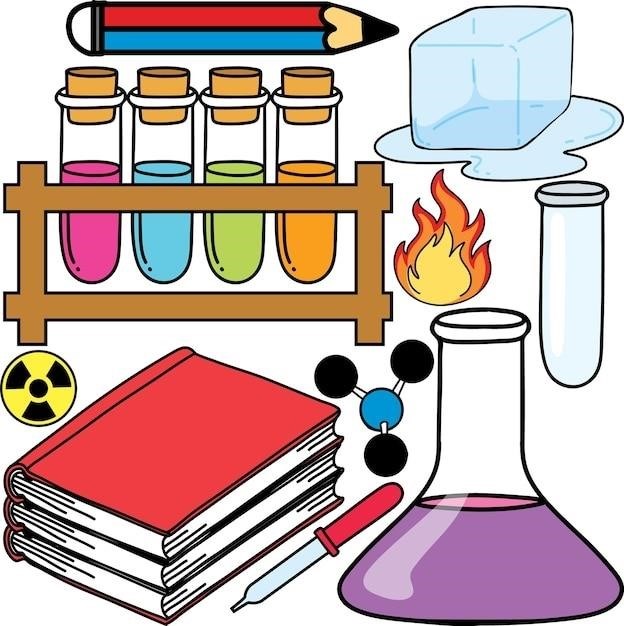Chemistry Notes PDF⁚ A Comprehensive Guide
This comprehensive guide explores the world of chemistry notes in PDF format, offering valuable insights for students at all levels․ We delve into the reasons why these notes are essential, the various types available, and the numerous benefits they provide; Discover where to find these resources, learn effective note-taking techniques, and explore recommended resources to enhance your chemistry learning journey․
Why Chemistry Notes Are Essential
In the intricate world of chemistry, where concepts intertwine and formulas dance, having a solid foundation is paramount․ This is where chemistry notes step in, acting as your trusted companions on the path to mastery․ They serve as a powerful tool for understanding complex concepts, organizing information, and reinforcing key principles․
Chemistry notes provide a structured framework for organizing the vast amount of information encountered in this subject․ By neatly summarizing definitions, theories, and reactions, they help you grasp the interconnectedness of concepts and build a cohesive understanding․ Moreover, these notes serve as valuable study aids, enabling you to review material efficiently and identify areas that require further attention․
The act of taking notes itself is an active learning process․ Engaging with the material, summarizing key points, and creating your own interpretations deepens your understanding․ This active engagement fosters better retention and allows you to internalize the knowledge more effectively․ When you revisit your notes later, you’re not just passively rereading information; you’re actively recalling and connecting concepts, solidifying your grasp of the subject․
Types of Chemistry Notes Available
The realm of chemistry notes is diverse, catering to the specific needs of students at various levels and in different areas of specialization․ Whether you’re tackling introductory general chemistry or delving into the complexities of organic or physical chemistry, there’s a type of note tailored to your requirements․
General chemistry notes encompass a wide range of fundamental concepts, from atomic structure and bonding to chemical reactions and stoichiometry․ These notes provide a solid foundation for understanding the basic principles that underpin the broader field of chemistry․ Organic chemistry notes focus on the structure, properties, and reactions of carbon-containing compounds, exploring the fascinating world of organic molecules and their roles in living systems․
Physical chemistry notes delve into the theoretical underpinnings of chemical phenomena, employing mathematical models and principles from physics to explain chemical behavior; These notes explore topics like thermodynamics, kinetics, and quantum chemistry, providing a deeper understanding of the fundamental forces driving chemical processes․
2․1․ General Chemistry Notes
General chemistry notes serve as the bedrock for understanding the fundamental principles that govern the behavior of matter․ These notes typically cover a broad spectrum of topics, from the building blocks of matter—atoms and molecules—to the intricate dance of chemical reactions․
A comprehensive set of general chemistry notes would likely encompass topics such as⁚
- Atomic structure and electronic configuration⁚ Unveiling the secrets of the atom’s internal structure, including the arrangement of electrons and its implications for chemical bonding․
- Chemical bonding⁚ Exploring the forces that hold atoms together, including ionic, covalent, and metallic bonds, and their influence on molecular properties;
- Chemical reactions⁚ Delving into the processes by which substances transform into new ones, including balancing chemical equations, predicting reaction products, and understanding reaction rates․
- Stoichiometry⁚ Mastering the quantitative relationships between reactants and products in chemical reactions, allowing for precise calculations of yields and limiting reactants․
- States of matter⁚ Exploring the different phases of matter—solids, liquids, and gases—and the factors that influence their properties and transitions between states;
- Solutions and mixtures⁚ Understanding the properties of mixtures and solutions, including concentration units, solubility, and colligative properties․
- Thermochemistry⁚ Investigating the energy changes associated with chemical reactions, including enthalpy, entropy, and Gibbs free energy․
General chemistry notes are essential for students pursuing careers in various scientific fields, including chemistry, biology, medicine, and engineering․
2․2․ Organic Chemistry Notes
Organic chemistry notes delve into the fascinating world of carbon-containing compounds, exploring their structure, properties, and reactions․ This branch of chemistry is crucial for understanding the building blocks of life, as well as the vast array of synthetic materials that shape our modern world․
A comprehensive set of organic chemistry notes would likely cover topics such as⁚

- Nomenclature and functional groups⁚ Learning the systematic naming of organic compounds and identifying key functional groups, which dictate their reactivity and properties․
- Isomers and stereochemistry⁚ Exploring the different spatial arrangements of atoms within molecules, including enantiomers and diastereomers, and their impact on chemical behavior․
- Alkanes, alkenes, and alkynes⁚ Understanding the fundamental classes of hydrocarbons and their characteristic reactions, including combustion, halogenation, and addition reactions․
- Reactions of functional groups⁚ Delving into the specific reactions that occur at different functional groups, such as alcohols, aldehydes, ketones, carboxylic acids, and amines․
- Spectroscopy⁚ Utilizing techniques like infrared (IR), nuclear magnetic resonance (NMR), and mass spectrometry (MS) to analyze and identify organic molecules․
- Organic reactions mechanisms⁚ Gaining insights into the step-by-step processes by which organic reactions occur, including nucleophilic attack, electrophilic attack, and radical reactions․
- Named reactions⁚ Exploring a collection of well-established and commonly used organic reactions, each with its specific reagents and conditions․
Organic chemistry notes are essential for students pursuing careers in fields like pharmaceuticals, biotechnology, materials science, and chemical engineering․
2․3․ Physical Chemistry Notes
Physical chemistry notes delve into the fundamental principles that govern the behavior and properties of matter at the molecular level․ This branch of chemistry bridges the gap between macroscopic observations and the underlying microscopic processes․
A comprehensive set of physical chemistry notes would likely cover topics such as⁚
- Thermodynamics⁚ Exploring the concepts of energy, enthalpy, entropy, and Gibbs free energy, and their application to chemical reactions and physical processes․ Understanding how these concepts govern the spontaneity and equilibrium of reactions․
- Chemical kinetics⁚ Investigating the rates and mechanisms of chemical reactions, including the factors that influence reaction speed and the concept of activation energy․ Studying reaction orders, rate laws, and the Arrhenius equation․
- Quantum chemistry⁚ Applying quantum mechanics to understand the behavior of atoms and molecules․ Exploring concepts like wave functions, orbitals, and the electronic structure of atoms and molecules․ Understanding the principles behind spectroscopy and the properties of chemical bonds․
- Statistical mechanics⁚ Utilizing statistical methods to study the behavior of large ensembles of molecules․ Understanding the connection between microscopic properties and macroscopic observations, such as pressure, temperature, and entropy․
- Electrochemistry⁚ Exploring the relationship between chemical reactions and electrical energy․ Studying concepts like electrochemical cells, electrode potentials, and the Nernst equation․ Understanding the principles behind batteries, fuel cells, and corrosion․
- Surface chemistry⁚ Investigating the properties of surfaces and interfaces, including adsorption, catalysis, and surface tension․ Understanding the role of surfaces in chemical reactions and physical processes․
Physical chemistry notes are essential for students pursuing careers in fields like materials science, nanotechnology, chemical engineering, and analytical chemistry․
Benefits of Using Chemistry Notes
Integrating chemistry notes into your study routine offers a multitude of benefits that can significantly enhance your understanding and performance․ These notes act as a powerful tool for summarizing key concepts, organizing information, and facilitating effective learning and retention․
- Enhanced Comprehension⁚ Chemistry notes serve as a concise summary of essential concepts, allowing you to revisit and reinforce your understanding․ By organizing information in a structured manner, these notes facilitate a deeper comprehension of the subject matter․
- Improved Retention⁚ Active note-taking during lectures or while reading textbooks promotes active learning and improves information retention․ Regularly reviewing your notes helps reinforce key concepts and strengthens your memory․
- Time-Efficient Study⁚ Chemistry notes act as a valuable resource for efficient exam preparation․ They provide a focused overview of the material, allowing you to prioritize key concepts and identify areas needing further review․
- Personalized Learning⁚ These notes can be tailored to your individual learning style and preferences․ Whether you prefer detailed outlines, concept maps, or concise summaries, you can customize your notes to best suit your needs․
- Improved Problem-Solving Skills⁚ Chemistry notes can help you develop problem-solving skills by providing examples of worked-out problems and highlighting key steps involved in solving specific types of chemical calculations․
- Confidence Building⁚ Having a well-organized set of notes can boost your confidence in your ability to grasp complex chemical concepts and tackle challenging problems․
The benefits of using chemistry notes extend beyond academic success․ These notes can serve as a valuable reference tool throughout your career in chemistry-related fields․

Where to Find Chemistry Notes
The digital age has made accessing chemistry notes in PDF format incredibly convenient․ Numerous online platforms and resources cater to students seeking comprehensive and reliable study materials․ Whether you’re a high school student preparing for exams or a university student tackling advanced chemistry courses, there are several avenues to explore for quality chemistry notes․
- Educational Websites⁚ Many educational websites offer free or paid downloads of chemistry notes in PDF format․ These websites often provide notes for different levels of chemistry, from introductory to advanced courses․ They may also offer additional resources like practice problems, quizzes, and video tutorials․
- Online Learning Platforms⁚ Platforms like Khan Academy, Coursera, and edX offer free online courses in chemistry, often accompanied by downloadable notes․ These platforms provide a structured learning experience with engaging content and interactive exercises․
- University Websites⁚ Many universities make their lecture notes available online, often in PDF format․ This can be a valuable resource for students taking specific courses or wanting to access notes from renowned professors․
- Student Forums and Communities⁚ Online student forums and communities can be a great source of shared notes․ Students often post their notes for others to access, creating a collaborative learning environment․
- Textbook Publishers⁚ Some textbook publishers provide supplementary resources like online notes and study guides in PDF format․ These resources can be helpful for reinforcing concepts and providing additional practice problems․
When searching for chemistry notes, it’s essential to choose reliable sources from reputable institutions or educators․ Look for notes that are well-organized, accurate, and cover the relevant topics for your specific course or level of study․
Tips for Effective Note-Taking
Effective note-taking is crucial for understanding and retaining chemistry concepts․ It’s not just about passively copying information; it’s about actively engaging with the material and organizing it in a way that makes sense to you․ Here are some tips for taking notes that will enhance your learning⁚
- Preview the Material⁚ Before taking notes, skim the textbook chapter or lecture slides․ This will give you a sense of the key topics and concepts to focus on․
- Use a Clear and Concise Style⁚ Avoid writing full sentences․ Use bullet points, diagrams, and abbreviations to condense information and make your notes more manageable․
- Focus on Key Concepts⁚ Identify the main ideas and principles discussed․ Don’t try to write down everything; focus on the essential information you need to understand the topic․
- Use Different Colors and Highlighting⁚ Highlight important terms, definitions, and formulas․ Using different colors can help you visually distinguish between different concepts․
- Include Examples and Diagrams⁚ Visual aids can help you remember complex concepts․ Draw diagrams, write down examples, and use analogies to make the information more accessible․
- Review Your Notes Regularly⁚ Don’t let your notes gather dust․ Review them regularly, even if it’s just for a few minutes each day․ This will help you reinforce the concepts and identify areas where you need to study further․
Remember, note-taking is a personal process․ Experiment with different techniques and find what works best for you․ The key is to create notes that are clear, concise, and easily understandable when you need to review them․
